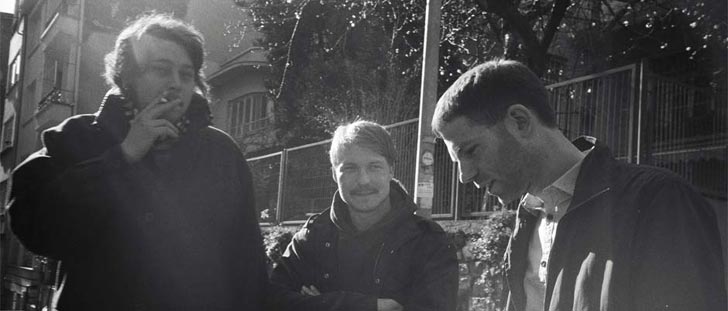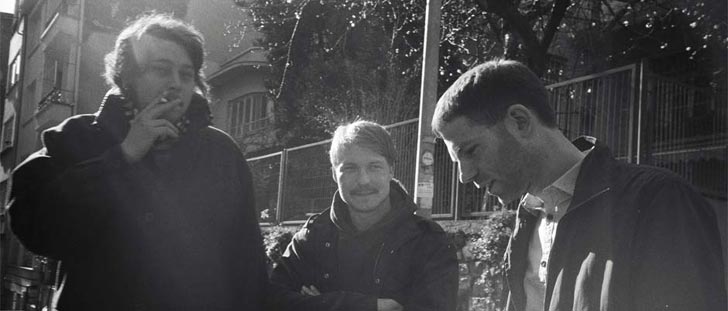
The Radio Dept. first started playing together in 1995 in Lund, Sweden and named themselves after a gas station that reopened as a radio repair shop. After going through many lineup changes, the band is now a trio, with Johan Duncanson at the helm. Their newfound fame comes as a big surprise, and they never saw it coming.
“We were surprised and happy about it. I mean, we don’t even have an American record deal,” says Duncanson, about the recognition they’ve been given stateside. Though the band members tend not to think about the business aspects of the industry, such as publicity, promotion, and dealings with record labels, they still like to have as much control over the direction of their music as possible. This attitude also extends to their writing and recording processes; for Clinging To A Scheme, The Radio Dept. adhered to tried-and-true methods.
“The actual principles of recording and [using] the equipment were exactly the same [as on previous releases],” states Martin Larsson. The equipment includes a basic PC, a couple of toy synthesizers, a small amplifier, an electric guitar and a bass. Rather than using Pro Tools, Logic, or any especially complex audio recording software, the band records the album using Cool Edit Pro, which speaks to the their stripped down, DIY recording aesthetic. Instead of worrying about expensive gear, big name producers and studio time, the band handles all of their production work, with the exception of mastering.
“Mastering is usually done with someone else. We’ve always had problems with mastering, and there’s a lot of back and forth,” says Duncanson, who mentions that the record was mastered four times. Such a level of meticulous craftsmanship has always been vitally important to the band.
Listen to “Heaven’s On Fire” – DOWNLOAD MP3
Clinging To A Scheme is a less noisy than previous The Radio Dept. records and also incorporates electronics in a more intricate and stylized fashion. The band is exceptional at layering compelling electronic flourishes into percussion, as well as keeping every frequency covered through the use of synth pads, guitar reverb, and layers. Intricate melodies, written for both vocals and guitar, are interwoven amongst everything else, but are never lost in the mix. All of these elements can be seen throughout their work and are achieved through diligence, a fantastic ear for production, and lots of time slaving away in their recording space.
Clocking in at around thirty-four minutes and with a length that feels just right, Clinging To A Scheme has absolutely no filler, and the band prefers its short run time. Though Clinging To A Scheme is the band’s first full-length in six years, a look at their back catalogue reveals a very high ratio of singles and EPs to albums, and they have a compelling reason for keeping that ratio high.
“We like shorter formats… you can try out ideas and be very conceptual about them, without [them] getting boring,” Duncanson explains. For example, Duncanson feels that the band’s second full-length and longest-running album, Pet Grief, ended up being longer than they would have liked and retains the same mood throughout its duration. With their shorter and more conceptual work, they have been able to tackle politics head on (Freddie and the Trojan Horse) and flesh out musical themes that are otherwise only hinted at, like dub and reggae (Never Follow Suit).
Another reason for the band’s inclination towards shorter formats is probably the prolific rate at which Duncanson writes music.
“Ninety percent of the songwriting is done by [Duncanson], but I write some of the songs as well,” says Larsson. “[He] writes songs like crazy, and it’s hard to keep up.”
“Sometimes I will bring in a recording that I’ve started or just play ideas on an acoustic guitar, and then we go from there,” says Duncanson, about the songwriting methodology.
The band will usually work on arranging the songs together, but according to Larsson, The Radio Dept. never turns to jamming or more free-form songwriting processes. “We’ve actually never done that, ever,” he says.
Music is now a full-time gig for all three band members, although it remains difficult.
“It’s been really tough economically,” says Duncanson. “We’ve tried to live off the band for a while. [But] even if we’re really poor, it’s still a luxury to be able to live off your music.”
Having given only a small number of English language interviews and spent very little of their time and effort on publicity, The Radio Dept. have relied largely on their music to propel them forward. The current buzz and success that the band has seen stateside bodes well for their financial and musical future. 2011 will see them touring more in the States and in Europe, including slots at some of the biggest music festivals in America, including Coachella and Sasquatch.
As a musical project that is sixteen years in the making, The Radio Dept.’s successes are well-deserved. They have been relatively unknown for far too long, so keep them on your radar if they aren’t there already.






